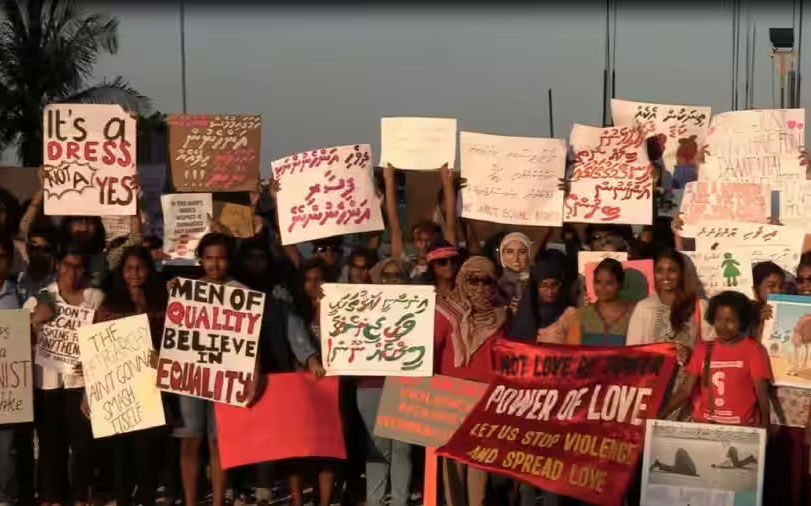
THE SILENT SUFFERERS - "ABOUT DOMESTIC VIOLENCE"
She is at the Psychological counseling clinic for an appointment accompanied by her brother. Her voice trembles with fear yet clear. She appears to be a woman in her thirties. She says that she has been married for twelve years and has a daughter who is eleven years and a son who is nine years old. She feels miserable when her daughter says, "one of these days one of us is going to die in the hands of appa and you still will do nothing about it". She feels helpless and feels guilty for not being able to protect her children from the violence.
She then goes to elaborate about the everyday occurrence. When the dinner is not up to his taste, he dumps all the food out. He starts pulling her hair, slaps her on her face, hits her head against the wall and says that she is good for nothing and that she can't even cook a decent meal for the family. While she continues to fulfill his demands, he continues with his blaming, yelling, beating until 2 AM after which both of them get tired and fall asleep. Five out of seven days have such outbursts either inflicted on her or on the children. She further adds that she cannot tell her family or friends for both of them are professionals and it will affect their social status. Is this horrifying experience a simple "family feud" or "domestic violence"?
Spouse or partner abuse is commonly termed "domestic violence". It is a crime that is perpetrated by both genders. Some estimate, every 15 seconds around the world, an individual is victimized most often in one place where they should feel safe…the home. The battering of spouses is a significant problem in Indian culture. It has, for far too long, gone unnoticed, been tolerated. Although batterer can be either gender, the battered are primarily women and often children.
The roots of domestic violence are embedded in attitudes toward women which have existed for hundreds of years. Even today we are in a society where a woman is treated as the property of her husband and his family. It is seen as having the right to use physical force in relating to her if necessary. As with all social problems, the causes of domestic violence are many and sometimes complex. Below are some facts which keep domestic violence from being recognized as a crime:
- Verbal and physical violence are learned behavior.
- Violence in relationships is often a means to maintain "control" in the relationship.
- Inability to take domestic violence as a serious problem as many still believe it is a private matter within the family.
- Domestic violence is a matter of destiny and not choice.
Children, who are raised out of such families, either grow out to be these fine young people fighting all odds to make it well in life. Then there are these children, who grow up with low self esteem, helplessness & hopelessness while others follow the vicious cycle of mistreating other humans. We often speak about empowerment and how children are our future. We need to have a civilian responsibility to identify, acknowledge and take necessary actions to stop this vicious cycle. Given below are several forms of domestic violence.
Verbal abuse: Calling names, yelling, and screaming, blaming spouse for anything and everything, using profanity at the slightest trigger. Carrying grudge against the individuals and taunting them with demeaning statements.
Physical abuse: Kicking, biting, pulling hair, hitting, pushing, choking and assaults with weapons are behaviors most often associated with physical domestic violence. The victim of chronic abuse have bruises on face, neck, arms, legs, or torso which are in a variety of healing stages or shows signs of swelling or puffiness in the face or around the eyes. Normally the victims have ready explanations for such injuries, not wishing to raise any suspicions on the part of family, neighbours or co-workers.
Sexual abuse: Sexual violence also referred to as "marital rape" is a form of violence whereby sex is used to hurt, degrade, dominate, humiliate and gain power over the victim. It is an act of aggression. Forced sexual activity and sexual sadism are forms of sexual domestic violence and threats often accompany such abuse.
Intimidation, e.g. looks, Gestures, smashing things, or destroying the victim's property, threats to harm a child or children. Batterers isolate the victim from family and friends thus causing emotional and psychological damage.
General characteristics of the batterer:
- Often refuses to accept responsibility for abuse, shifting blame on the battered and all other stressors of life.
- A batterer often denies the existence of violence and its effect on the battered and the family.
- There is extreme possessiveness and jealousy thus isolating the battered from family and friends.
- May have grown up in a family where dominance over relationships was modeled verbally and physically.
- Have cynical and negative attitude towards batterer specifically, people and life as a whole.
- Inability to hold steady jobs or steady friends.
- In come cases, there is alcohol, drug abuse or sexual promiscuity involved.
General characteristics of the battered:
- Battered individuals come from all sectors of society.
- They feel degraded and worthless.
- They lack self-esteem. They fear of being seen as a "failure" or worse yet, they may believe they "deserve" the mistreatment.
- They believe that it is their duty to keep the family together, no matter what the cost is. Therefore, they endure the abuse for the sake of the children and to save the face of their family, community and society.
- Economic dominance by the batterer, forces the battered to continue the abusive relationship.
- Family and social prestige prevents them from revealing the abuse.
As stated earlier, "domestic violence" is not a mental disorder, and so there is no need to consult a psychiatrist. Seeking immediate professional counseling help is mandatory. The myth that "domestic violence" is family feud and not of societal concern must be removed from the minds of one and all in the society. Early intervention will certainly help both the "batterer" and the "battered".
It is important to remember that "domestic violence must never be considered acceptable or a "natural" part of family life. Prevention of "domestic violence" is dependent upon individual, community, national and international efforts. It must begin with an awareness of the problem and education toward understanding how "domestic violence" affects the members of the family, community and society as a whole.
Professional counselors must join hands with members of criminal
justice system, e.g. police, prosecutors and judges for "domestic
violence" prevention efforts. Courts must have simpler, more
effective and efficient procedures to restrain batterers and bring
effective laws governing domestic violence crimes. Community based
agencies and social service organizations must make a commitment to
take action, become involved in seeking solutions to domestic
violence, provide help to troubled families, and educate the general
public. Change in the attitude must occur toward the silent
sufferers. How can we, as responsible members of the society assume
that "home" is the safest place for one and all?

